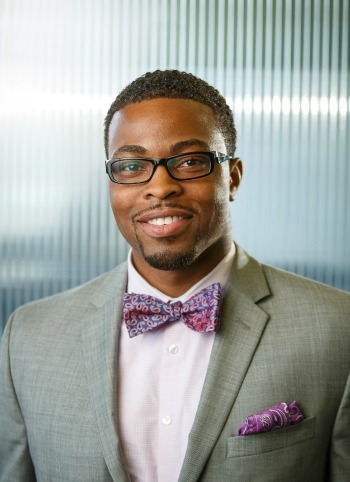 Photo of student Dr. Feranmi Okanlami, MD
Photo of student Dr. Feranmi Okanlami, MD
Feranmi Okanlami, who grew up in South Bend, graduated from Stanford University, and earned an M.D. at the University of Michigan, suffered a paralyzing spinal cord injury from a diving accident while he was an orthopaedic surgery resident at Yale-New Haven Hospital. After inpatient therapy in Chicago, he returned home for outpatient therapy and joined ESTEEM in 2014. His capstone thesis, in partnership with the Cleveland Clinic and Custom Orthopaedic Solutions, involved a patient-specific medical device intended to make pedicle screw placement in spinal surgeries faster and more accurate – equipment that could have enhanced his own surgeries.
After he graduated, Okanlami, who is completing his residency in family medicine at Memorial Hospital of South Bend, was appointed by South Bend Mayor Peter Buttigieg to the St. Joseph County Board of Health, a position that offers numerous opportunities to impact health care in the community. He is vice president of the River City Challenged Athletes, which provides involvement in adaptive sports for people with disabilities for social and physical stimulation as well as connections to useful resources. Among other things, Okanlami helps oversee the Sled Rovers, a sled hockey team, and the River City Rollers, a wheelchair basketball team that he coaches.“I found the ESTEEM program while looking for something I could do to stimulate myself intellectually while I was working myself physically,” Okanlami says. “It was a perfect find. They did a really good job of pairing me with a thesis project that was commensurate with my level of training. Part of my elevator pitch when I was talking about my thesis was my own story, the surgeries I had, and that the device I was trying to propose was something that could have been used for me.” The project involved customer validation, product design, product development, cadaveric studies, analysis of the competitive landscape and investigation into intellectual property to bring the technology closer to commercialization.
“I have the desire to improve the access to and delivery of healthcare and medical education around the world, using innovation and technology,” he says. “I am dedicated to demonstrating that being ‘disabled’ does not mean that one is ‘unable’ by providing examples, opportunities, and resources for individuals with disabilities to lead healthy, active, and fulfilling lives.”
Okanlami, who mentored a student in last year’s ESTEEM class and regularly speaks at the College of Science’s one-day course on diversity, is involved in a host of volunteer activities, including the board of directors of WNIT Public Television; the capital campaign for the Clubhouse of St. Joseph County, which supports people with psychiatric disabilities; DC Design, which helps clients solve problems with design thinking and prototyping; and the Black Angel Technology Investment Fund for Stanford students and affiliates.
“I have to give ESTEEM a lot of credit for a lot of the opportunities I’ve had. I conceptualize things a different way. I go after opportunities more. I’m always thinking about how I can do the next thing. It’s that entrepreneurial spirit that ESTEEM has helped to nourish. I give the program credit for helping me with that.”